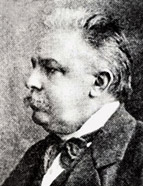

Marques Gomes took part in the production of the 12th volume of História de Portugal popular e ilustrada [Popular and Illustrated History of Portugal] by Manuel Pinheiro Chagas. In this work, his contribution is more wide-ranging and covers not so much local history as a series of important political events in national life in the second half of the 19th century, from the beginning of the period known as Regeneration (1851) to the English "Ultimatum" of 1890.
The first chapters place a particular emphasis on the public works policies undertaken by Fontes Pereira de Melo, such as the construction of roads, bridges, and railways. In addition, the political movement of 1851—the Regeneration—was a period that brought calm in politics, greater freedom and tolerance, and the infrastructure development policies emphasised the idea of progress in the country. The strength of the first republican ideas in Portugal in the context of a constant decline of constitutional monarchy is another key point highlighted by Marques Gomes in this work. Another obvious aspect that Marques Gomes took up as a feature of his historical studies was the celebration of the centenaries of Camões in 1880 and of the Marquis of Pombal in 1882. On the three hundredth anniversary of Camões, Marques Gomes looked at Portugal's historic role in the march of modern civilisation and its epic tale of freedom, fraternity, and progress (pp. 505-507). With regard to the centenary of the Marquis of Pombal, and unlike what had happened with Camões in 1880, it was up to the government to organise the event, having appointed a commission chaired by Rodrigues Sampaio. The author develops a historicist interpretation of Pombal, presenting him to 19 th -century Portuguese society as "(...) one of the forerunners of liberalism and democracy itself." ( História da História em Portugal. Séculos XIX-XX [The History of History in Portugal. 19th-20th Centuries], 1996, p. 623). Another of the particularly important historical moments highlighted in this work by Marques Gomes is the English Ultimatum of 1890. This political event, which would mark "the progress of the decadence" of the Constitutional Monarchy, came in a context in which Portugal sought to define its borders in Africa and, to this end, drew a map that would unite the territories of Angola and Mozambique under Portuguese administration, which was accepted internationally—a map that became known as the "pink map."
This work is financed by national funds through FCT - Foundation for Science and Technology, I.P, in the scope of the projects UIDB/04311/2020 and UIDP/04311/2020.
